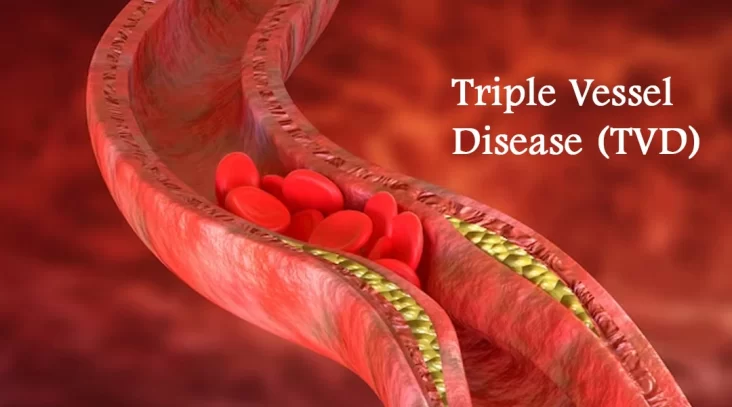Triple vessel disease (TVD) is a medical term used to describe a condition in which there is significant blockage or narrowing of all three major coronary arteries that supply blood to the heart muscle. The coronary arteries are responsible for delivering oxygen and nutrients to the heart.
Coronary artery disease (CAD) occurs when plaque, a buildup of cholesterol, fat, and other substances, accumulates in the coronary arteries. This can lead to atherosclerosis, a condition where the arteries become narrowed and hardened, restricting blood flow to the heart muscle.
In the case of triple vessel disease (TVD), all three main coronary arteries—the left anterior descending (LAD), left circumflex (LCx), and right coronary artery (RCA)—are affected by significant blockages or stenosis. This can severely compromise blood flow to various parts of the heart, potentially leading to myocardial infarction (heart attack) or other cardiovascular complications.
Common symptoms of triple vessel disease (TVD) may include
- Angina: Chest pain or discomfort that occurs when the heart muscle doesn’t receive enough blood and oxygen.
- Shortness of Breath: Difficulty breathing, especially during physical activity.
- Fatigue: Feeling unusually tired or exhausted.
- Sweating: Excessive sweating, particularly during episodes of angina.
- Nausea and Dizziness: Some individuals may experience nausea or dizziness, especially if there is a decrease in blood flow to the heart.
Diagnosis typically involves a combination of medical history assessment, physical examination, and various tests such as electrocardiogram (ECG or EKG), stress tests, echocardiography, coronary angiography, and other imaging studies.
Management and treatment options for triple vessel disease (TVD) may include lifestyle changes (such as diet modification and regular exercise), medications to control blood pressure, and cholesterol levels, and prevent blood clots, and, in some cases, invasive procedures like coronary angioplasty with stent placement or coronary artery bypass grafting (CABG). The choice of treatment depends on the severity of the disease, the patient’s overall health, and other individual factors.
It’s crucial for individuals with symptoms of triple vessel disease or any form of coronary artery disease to seek prompt medical attention for proper evaluation and management. Early intervention can help prevent complications and improve overall cardiovascular health.


One Comment
Pingback: Triple Vessel Disease (TVD) – Sujata Birla Hospital